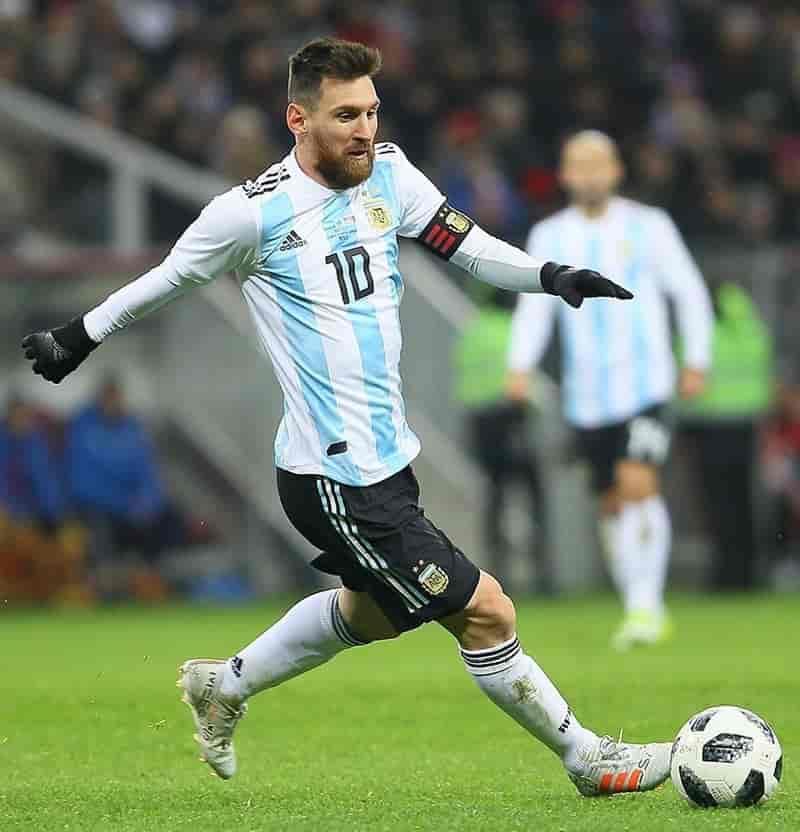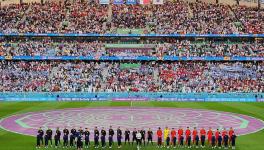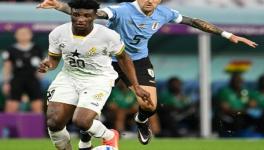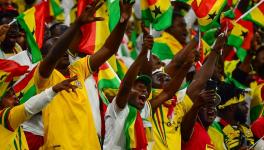Qatar World Cup Ends With the Greatest Final

Lionel Messi led Argentina to a win on penalties over defending champions France at the Lusail Stadium in Qatar on Dec. 18 Image Courtesy: Media.snl
Lionel Messi, and Argentina, have the FIFA world cup 2022. Make no mistake. That is exactly the order in which this story is meant to be told. The greatest club footballer of our lifetime decided, finally, to give the nation of his birth something proper to chew on. A night of football the world will remember for decades.
Through conversations I was having while the game was on, the draw of one man was clear across time zones; from North America to Australia (no jokes). Their first world cup since Diego Maradona in 1986 made generations of Indians and Pakistanis and Bangladeshis (and Argentinians, of course) dress in the blue and white stripes every four years in the hope that collective struggle, a little bit of madness and the genius of a five foot something No. 10 is the ultimate way to stick it to the man. That is what defines Argentina’s football identity (at least to the rest of us) and, by construct, the relationship the fans have with the national team.
Unlike Brazil, where football is fun and music and dance, here it was always more the struggle, pain, sacrifice and a little bit of chaos. Part of the trouble between Messi and Argentina has always been that there’s not enough chaos. That fans couldn’t figure out what was going on in his head. For too many years Messi won too much with Barcelona. So much that he became more Catalan hero than Argentine. Loyal (what’s an intra-Qatar trade?), reserved (inscrutable?), respectful and not so far known to be a creep. “If you’re that good,” I’ve heard on many occasions, “you’d better be winning trophies.”
None of this matters any longer, of course. Messi’s relationship with Argentina was complicated. It veered down that cliff again, for a minute, when the South American champions lost to Saudi Arabia (who were much better than expected) in their opening game. But, in the few days since, the equation has changed for good.
I was reporting on the Euros in 2016 when Messi announced a brief retirement from international football. Having lost the world cup final in 2014, and successive Copa America finals, he was done taking the fall for the team’s lack of championships. He was done with the nation’s fans equating football, and his personal identity, with results in football tournaments. My editor wanted reactions so I rounded up what Argentines I could. Most were ambivalent. “Maybe it will be for the good of the team,” was one thought. “He’s always been too good for Argentina,” was the other. “He carries the team and they blame him when they lose.” Neither binary works, obviously.
And today none of that ambiguity remains. Its last traces disappeared the moment he called a bewildered Wout Weghorst “bobo”, in the tunnel after the first “Battle of Lusail”. I guess it’s critical to note, at this point, that Messi remained close to Argentina and to Rosario all those missed years. His split from the national team too, was brief. Perhaps, there was faith that eventually the Jose Pekerman generation would come good.
The Pekerman project began with the World Youth Championship right here in Qatar back in 1995. Argentina invested in a long-term youth development programme and a holistic idea of player development. The programme, at least on the men’s side, produced the kind of talent even France would be proud of. Of the following seven championships, Argentina won five. The batch of 2022 in Qatar is the last of the Pekerman generation—Messi and Angel Di Maria among the players and Walter Samuel and Pablo Aimar in management. The hope was for investment in youth to pay off at senior level.
For decades, despite a list of names that would have even the most partisan football fans drooling, the results stopped short of the gold standard. It was only last year that the team finally brought home a big trophy—the Copa America—after a gap of almost 30 years. It wasn’t enough though. In the Eurocentric—and increasingly Asia centric as far as audiences are concerned—football world not enough people watch the Copa America. Besides, Argentina always considered themselves continental heavies; it's on the world stage that there was unfinished business.
At the Lusail Iconic (no jokes again) stadium, it couldn’t have been written better by the scriptwriters. In the blue corner—defending champions of the world, untroubled in more world cup games than anyone cares to remember, representing the greatest football factory on the planet—France. And with Kylian, “more world cup goals than Pele at his age” Mbappe.
In the other corner—Messi. Not in one conversation was it about anything else. In the press conferences before the game the few questions that began with “apart from Messi”, ended in very short answers. Even the most pragmatic of football theorists, at the end of a full team analysis, ended with, “But, Messi.” Everyone else in sky blue and white reduced to a secondary role—the bodyguard, the outlet, the counterfoil, the defensive cover.
And, for the first half an hour of the best final neutrals could have asked for, it was Messi. He drove the team forward with purpose and poise. Argentina looked to have built on the pain and the collective struggle of the previous rounds. Just like the team on the other side of the pitch, each man fought for the next.
The French, dazed by the after effects of a virus, looked out of step. Before they knew it Di Maria had fed off the energy and decided to be leading wingman. Without having touched the ball in anger the defending champions were two goals down. Even before that, the game against Tunisia was a warning. Didier Deschamps, painfully aware, thanks to mavericks in the media, of the possibility of being the first man to win two world cups as a coach and one as a player, made nine changes to his A-team. The game was largely ignored except by Tunisia who enjoyed ending their campaign on a high. Having started the tournament without four or five starting players, France were staring down the abyss.
Deschamps, it seems, remembered what he had been telling the press all along. The strength of his time was in its unity. Add to that, players who are forged in a cauldron the likes of which the world has not seen. With 10 minutes of regular time to play, the writing was on the wall. Up stepped Deschamps’ B-team. In the 82nd minute Kingley Coman muscled Messi off the ball initiating a counter that led to another impeccable team goal for France.
Messi had six for the tournament so Mbappe decided to level up. 90 seconds later, off a volley teed up inch-perfect by another B-teamer, Marcus Thuram, slammed in the bottom right corner. 2–2. Just as they had against the Netherlands in the quarter-final, Argentina refused to do it the easy way. Two more goals, the first hat-trick in a men’s final since 1966, even. And still we were tied. At that point even if the two teams were to pick straws, France’s would be the shorter. The world had suffered too much for Messi to come so close and to be denied. Arsenal discard Emiliano Matrinez, who has since grown into one of the best in his position, and the support cast of the B-team, who changed the game, reinforced France’s energy and intent and brought them back from a hard place, made sure it wasn’t so. Just as.
he had at the youth championships in 2005, Messi was awarded player of the tournament. And, as if we needed another example of the mixed-feelings this tournament has left us with, Martinez celebrated his prize, as best ‘keeper, by first using it as a phallic symbol, and then sucking on its thumb.
In dragging the rest of us through that well of pain they reminded us, both sides, of why we love this sport. And why we loathe it. There could not have been a more fitting end to this tournament than the 130-or so minutes we witnessed last night. Messi and Mbappe—representing an old generation and a new—made sure it would be empirically very difficult to contend with Gianni Infantino’s hyperbole about “the best world cup ever”.
At the coronation, though, you couldn’t help but wonder. Is this the future of the sport? The best players in the world–both employed by the same boss, fighting it out in his stadium, on national day of his kingdom at the end of a billion-dollar party held only to encourage future billion-dollar parties–unequivocally telling us what football has become? Will a troubled nation, with the highest inflation rate of any participating nation and who’s president showed rare discretion to avoid flying in for the final at state expense, unite and build a future more in tune with the needs of all its people? Will these modern-day kings wield their almost unlimited powers in defence of the defenceless? Or is the story just that a new king has been crowned and, in the end, Qatar wins. Find out more next week, when top flight European football returns.
Get the latest reports & analysis with people's perspective on Protests, movements & deep analytical videos, discussions of the current affairs in your Telegram app. Subscribe to NewsClick's Telegram channel & get Real-Time updates on stories, as they get published on our website.
























